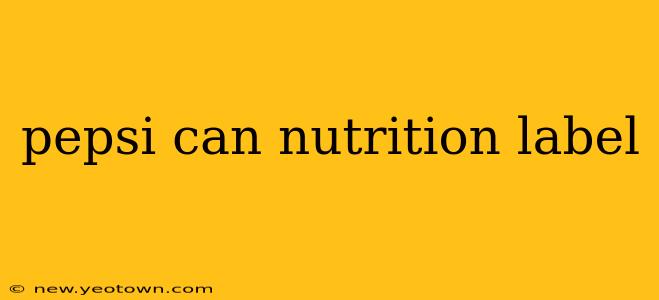Let's be honest, grabbing a refreshing Pepsi is a common treat for many. But have you ever really stopped to examine that tiny nutrition label stuck to the side of the can? It's packed with information, and understanding it can make all the difference in your choices. This journey isn't about demonizing Pepsi, but about empowering you to make informed decisions about your consumption. We'll explore everything from the basics to some of the more nuanced aspects of Pepsi's nutritional profile.
What are the main ingredients in a Pepsi can?
The primary ingredients in a standard Pepsi can usually include carbonated water, high fructose corn syrup (or sugar, depending on the region and specific product), caramel color, phosphoric acid, caffeine, and natural flavors. These ingredients combine to deliver that iconic Pepsi taste. However, the exact formulation can subtly vary depending on the specific Pepsi product (Diet Pepsi, Pepsi Zero Sugar, etc.) and local regulations. Always check the label on the can itself for the most accurate ingredient list.
How many calories are in a 12-ounce can of Pepsi?
A standard 12-ounce can of Pepsi typically contains around 150 calories. However, this number can fluctuate slightly depending on the specific formulation and whether it’s a regular Pepsi or a diet/zero-sugar version. Diet and zero-sugar options often boast zero calories, but this is achieved through the use of artificial sweeteners. It's always crucial to double-check the nutrition facts panel on the can you’re about to consume.
How much sugar is in a can of Pepsi?
This is a big one! A regular 12-ounce can of Pepsi generally contains about 41 grams of sugar. That's a significant amount of added sugar, exceeding the recommended daily intake for many individuals. This highlights the importance of moderation when enjoying sugary drinks. Again, the sugar content will differ depending on the type of Pepsi – Diet and Zero Sugar versions use artificial sweeteners to eliminate or drastically reduce the sugar content.
What are the nutritional benefits of Pepsi? (Or lack thereof)
Let's be realistic: Pepsi doesn't offer significant nutritional benefits. It's primarily a source of carbohydrates (from sugar) and caffeine. While caffeine can provide a temporary energy boost, it's not a replacement for a balanced diet. The significant sugar content and lack of essential vitamins, minerals, or fiber mean Pepsi should be considered a treat rather than a nutritional staple.
What are the health risks associated with drinking Pepsi regularly?
Regular consumption of sugary drinks like Pepsi can contribute to a variety of health issues, including weight gain, type 2 diabetes, heart disease, and tooth decay. The high sugar content is the primary culprit, leading to increased calorie intake and potential metabolic disruptions. Remember, moderation is key. Occasional consumption is unlikely to cause harm, but making Pepsi a regular part of your diet could have negative long-term consequences.
Is Pepsi suitable for weight loss diets?
Generally, no. Due to its high sugar and calorie content, Pepsi isn't a suitable beverage for most weight loss diets. The added sugars provide empty calories, contributing to weight gain rather than supporting weight loss goals. Diet and Zero Sugar options might seem like a better choice, but even artificial sweeteners can have unexpected metabolic effects and may not support long-term weight management as effectively as water or unsweetened beverages.
Does Pepsi contain artificial sweeteners?
This depends on the specific Pepsi product. Regular Pepsi does not contain artificial sweeteners. However, Diet Pepsi and Pepsi Zero Sugar use artificial sweeteners like aspartame or sucralose to achieve their zero-calorie profiles. The type and amount of artificial sweetener will be listed on the nutrition label.
This detailed exploration of the Pepsi can nutrition label aims to equip you with the knowledge to make informed choices. Remember, awareness is the first step towards responsible consumption. Always check the label on your specific can for the most accurate information.

